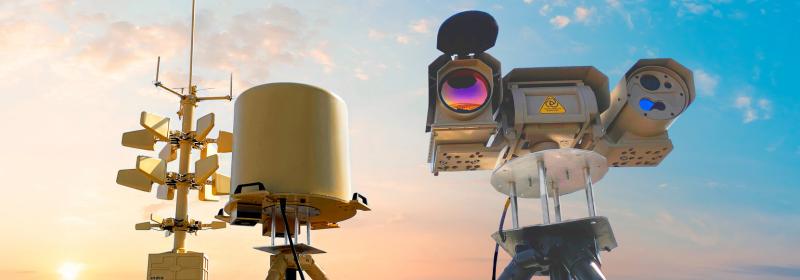- The company is part of the core group of companies leading the EU-driven multinational JEY-CUAS project, coordinated by Leonardo, involving technological and research centers from across the continent
- Indra has coordinated the Spanish involvement in the project, has defined how to operate with the systems in different scenarios and has also analyzed the most advanced technologies to detect, track and neutralize hostile UAVs in the civil and military environments
- European industry is among the most advanced in the world in the development of these kinds of systems, which are vital for protecting critical infrastructures, military bases, convoys and all types of strategic air, naval and land platforms

Indra, a global defence, aerospace and technology company, is one of the partners with largest participation within the European project that is developing the anti-drone systems of the future, a key technology for the continent’s defence and to ensure the operational capacity of its armies.
The company is a member of the core group heading the Leonardo-led JEY-CUAS project, which has been fostered by the EU through the European Defence Industrial Development Program (EDIDP).
Companies and research centers from all over the continent have joined forces to set out the different technologies to be used by the future generation of anti-drone systems, which are evolving towards increasingly specialized solutions suited to the specific operating environment in which they will be used. This means that the most effective solutions will be those capable of integrating the largest number of detection and neutralization technologies.
Within the project, Indra has coordinated the participation of Spanish industry and led the definition of the operational concept, carrying out a high-level analysis of the problem, studying how to operate with the systems in each scenario and evaluating the types of users, the potential evolution of the technologies and the applicable methodologies, among other issues.
It has also led the development of key technologies such as the jammer and passive radar and studied the typology of any potential attacks. It has also assessed different kinds of soft-kill and hard-kill countermeasures, including laser energy, electromagnetic pulses and different types of kinetic neutralizers. Furthermore, it has analyzed several detection systems, including radars, acoustic systems, infrared and visible spectrum cameras and radio frequency sensors.
Finally, Indra has played a key role in integrating all these sensors and effectors, incorporating them into anti-drone command and control systems through a standard protocol and striving to guarantee their interoperability with other higher-level command and control systems. Moreover, new artificial intelligence modules have been set out and tested to increase the accuracy and efficiency of the future systems.
Indra has taken part in a recent demonstration in Italy in which some of the main capabilities of the future generation of antidrone systems were examined. Its implementation will be addressed in forthcoming projects to be fostered through the European Defence Fund. The demonstration, together with the preliminary design review to be carried out in the coming weeks, will bring the JEY-CUAS project to a close, thereby completing the first stage of the program’s global roadmap.
The ability to provide protection against drones is key to any army and State’s security forces. These devices have become effective low-cost weapons capable of attacking aircraft, ships and armored vehicles of enormous strategic value. They are also being used as loitering munition, which flies over an area awaiting potential targets.
About JEY-CUAS
JEY-CUAS (Joint European sYstem for Countering Unmanned Aerial Systems) is a European project that strives to develop technologies to create a new generation of C-UAS systems based on a modular and flexible plug’n’play architecture to address the challenge posed by micro and mini drones. The solution contributes to improved situational awareness and counteracts the increasing resilience of UAS to the first generation of C-UAS, responding to new LSS (Low, Small, Slow) threats and reducing reaction times.
This project has received funding from the European Defence Industrial Development Program (EDIDP) under Grant Agreement EDIDP-CUAS-2020-78-JEY-CUAS. The contents reflect only the authors’ view and the European Commission is not responsible for any use that may be made of the information it contains.
About Indra
Indra (www.indracompany.com) is one of the leading global defence, aerospace and technology companies, and a world leader in digital transformation and information technologies in Spain and Latin America through its subsidiary, Minsait. Its business model is based on a comprehensive range of proprietary products, with high-value approach and a significant innovative component, making it the technological partner for the digitalization and key operations of its clients around the world. Sustainability forms part of its strategy and culture in order to overcome current-day and future social and environmental challenges. In the 2023 fiscal year, Indra achieved revenue totaling €4.343 billion, with more than 57,000 employees, a local presence in 46 countries and business operations in over 140 countries.